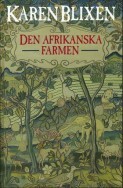You need to sign in or sign up before continuing.
Take a photo of a barcode or cover
Read 2/3. Couldnt finish it! The language is just unbearable to read, no flow at all!
This is one of the most beautifully written books in the English Language--IMO
"In the harbor of Mombasa lay a rusty German cargo steamer, homeward bound. I passed her in Ali bin Salim’s rowing boat with his Swahili rowers, on my way to the island and back. Upon the deck there stood a tall wooden case, and above the edge of the case rose the heads of two giraffes. They were, Farah, who had been onboard the boat, told me, coming from Portuguese East Africa and were going to Hamburg to a traveling menagerie.
The giraffes turned their delicate heads from the one side to the other, as if they were surprised, which they might well be. They had not seen the sea before. They could only just have room to stand in the narrow case. The world had suddenly shrunk, changed and closed round them.
They could not know or imagine the degradation to which they were sailing. For they were proud and innocent creatures, gentle amblers of the great plains; they had not the least knowledge of captivity, cold, stench, smoke, and mange, nor of the terrible boredom in a world in which nothing is ever happening.
Crowds, in dark smelly clothes, will be coming in from the wind and sleet of the streets to gaze on the giraffes, and to realize man’s superiority over the dumb world. They will point and laugh at the long slim necks when the graceful, patient, smoky-eyed heads are raised over the railings of the menagerie; they look much too long in there. The children will be frightened at the sight and cry, or they will fall in love with the giraffes and hand them bread. Then the fathers and mothers will think the giraffes nice beasts and believe that they are giving them a good time.
In the long years before them, will the giraffes sometimes dream of their lost country? Where are they now, where have they gone to, the grass and the thorn trees, the rivers and waterholes and the blue mountains? The high sweet air over the plains has lifted and withdrawn. Where have the other giraffes gone to, that were side by side with them when they set going, and cantered over the undulating land? They have left them, they have all gone, and it seems that they are never coming back.
In the night where is the full moon?"
"In the harbor of Mombasa lay a rusty German cargo steamer, homeward bound. I passed her in Ali bin Salim’s rowing boat with his Swahili rowers, on my way to the island and back. Upon the deck there stood a tall wooden case, and above the edge of the case rose the heads of two giraffes. They were, Farah, who had been onboard the boat, told me, coming from Portuguese East Africa and were going to Hamburg to a traveling menagerie.
The giraffes turned their delicate heads from the one side to the other, as if they were surprised, which they might well be. They had not seen the sea before. They could only just have room to stand in the narrow case. The world had suddenly shrunk, changed and closed round them.
They could not know or imagine the degradation to which they were sailing. For they were proud and innocent creatures, gentle amblers of the great plains; they had not the least knowledge of captivity, cold, stench, smoke, and mange, nor of the terrible boredom in a world in which nothing is ever happening.
Crowds, in dark smelly clothes, will be coming in from the wind and sleet of the streets to gaze on the giraffes, and to realize man’s superiority over the dumb world. They will point and laugh at the long slim necks when the graceful, patient, smoky-eyed heads are raised over the railings of the menagerie; they look much too long in there. The children will be frightened at the sight and cry, or they will fall in love with the giraffes and hand them bread. Then the fathers and mothers will think the giraffes nice beasts and believe that they are giving them a good time.
In the long years before them, will the giraffes sometimes dream of their lost country? Where are they now, where have they gone to, the grass and the thorn trees, the rivers and waterholes and the blue mountains? The high sweet air over the plains has lifted and withdrawn. Where have the other giraffes gone to, that were side by side with them when they set going, and cantered over the undulating land? They have left them, they have all gone, and it seems that they are never coming back.
In the night where is the full moon?"
“No me preocupa si el fuego se mezcla con la ceniza de mi muerte. Para mí, ahora, todo está bien.”
I read many years ago but have decided to reread of a few of my favorite classics, because as someone once said "The books haven't changed, you have!"
Rereading this as an adult had a much different message.
Rereading this as an adult had a much different message.
emotional
fast-paced
reflective
medium-paced
adventurous
emotional
informative
reflective
medium-paced
I always love to read books about Africa, whether they’re written by white people or natives to the continent. I’ve loved learning about Africa since I was young and every book and story I read simply adds to the picture I’m trying to develop in my mind of the place. While I tend to dislike short stories, I will occasionally enjoy those which include the same characters over and over. This book does exactly that. Farah the servant is a wonderful character, almost stronger than the narrator herself. It is so wonderful to read something which differentiates and personalizes each of the separate tribes of Africa – all of them found in a different areas, but overlapping as they move about their homeland. Exactly like the United States – only they have been doing it for centuries longer in Africa.
adventurous
emotional
funny
hopeful
informative
lighthearted
reflective
relaxing
slow-paced
adventurous
reflective
slow-paced
Isak Dinesen's memoir of her years in Africa, from 1914 to 1931, is a love story. No, not a love story as a romance between a man and woman, but one between Dinesen and the land (and people) of Africa.
After separating from her husband, who brought her to Kenya from Denmark, Dinesen learns how to manage a four-thousand-acre coffee plantation in the hills near Nairobi on her own. Her out-of-order account of African adventures paints a picturesque and impassioned perspective on the Kikuyu tribe who shares the land, neighboring Swahilis, Somalis, and many other tribes. She is also visited by other Europeans and a part-time lover, the big-game hunter Denys Finch-Hatton.
As the unnamed narrator (referred to once or twice as Baroness Blixen) becomes entrenched in the land, she becomes actively involved with the natives, running an evening school for children and adults and providing basic medical care when needed. The story eventually takes a tragic turn, when Blixen is forced to face the harsh realities of trying to operate a farm.
Major themes include Africa as a pastoral landscape, the differences between cultures, and the spirit of aristocratic nobility — something she feels middle-class settlers from Europe lack. She is also very sympathetic to the rapid introduction of culture and technology by the tribes, which did not benefit from the gradual adoption of such innovations as the Europeans did.
Despite its merits, not everyone will appreciate the tone, perspective, or lack of chronology to ground it. I'm a bit more forgiving in Dinesen achieves two ambitious endeavors — convey her deep love for Africa and the power of storytelling.
After separating from her husband, who brought her to Kenya from Denmark, Dinesen learns how to manage a four-thousand-acre coffee plantation in the hills near Nairobi on her own. Her out-of-order account of African adventures paints a picturesque and impassioned perspective on the Kikuyu tribe who shares the land, neighboring Swahilis, Somalis, and many other tribes. She is also visited by other Europeans and a part-time lover, the big-game hunter Denys Finch-Hatton.
As the unnamed narrator (referred to once or twice as Baroness Blixen) becomes entrenched in the land, she becomes actively involved with the natives, running an evening school for children and adults and providing basic medical care when needed. The story eventually takes a tragic turn, when Blixen is forced to face the harsh realities of trying to operate a farm.
Major themes include Africa as a pastoral landscape, the differences between cultures, and the spirit of aristocratic nobility — something she feels middle-class settlers from Europe lack. She is also very sympathetic to the rapid introduction of culture and technology by the tribes, which did not benefit from the gradual adoption of such innovations as the Europeans did.
Despite its merits, not everyone will appreciate the tone, perspective, or lack of chronology to ground it. I'm a bit more forgiving in Dinesen achieves two ambitious endeavors — convey her deep love for Africa and the power of storytelling.




